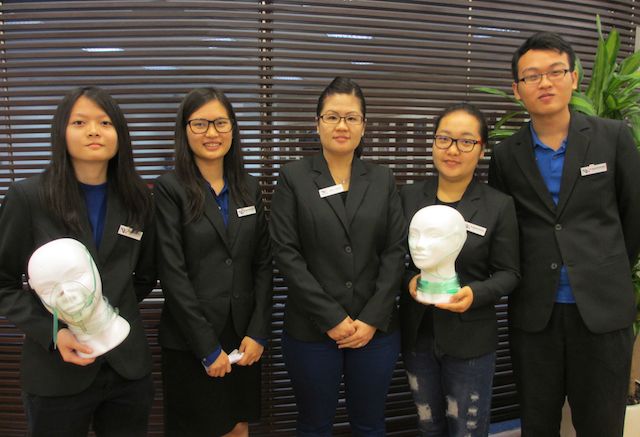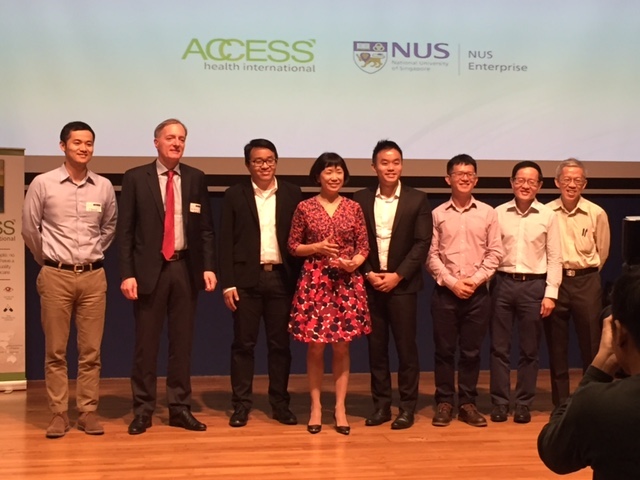Funding silver-sector businesses
Modern Aging Singapore 2016 awards seed-funding to three teams including a team developing a gel sheath that might reduce pressure ulcers.
BY: Eleanor Yap

Team Oxyvel – from left to right – From left to right, Ong Yin Miao, Nan Htet Myet Oo, Emily Kwan, Lu Fanrong and Toh Jian Yu.
A nursing lecturer from Nanyang Polytechnic and her final-year nursing students were recently awarded S$25,000 in seed-funding from Modern Aging Singapore 2016 to develop a silicone gel sheath that might reduce pressure ulcers around the ears of patients using oxygen delivery apparatus. According to the team, one out of every four people develop oxygen delivery device pressure ulcer over the ear region. The sheath will make it more comfortable for these patients who have the oxygen delivered through nasal prongs or a face mask. The team called Oxyvel was part of more than 80 teams that signed up for this year’s Modern Aging Singapore, a four-month entrepreneurial learning initiative that began in July.
The sheath can be washed and reused by the same patient, and it follows the contour of the ear, providing cushioning and protecting the contact pressure points on the patient’s face. The team’s first prototype consisted of a headband with Velcro. However, this did not receive good feedback from the clinical areas. After being introduced to the NUS Department of Biomedical Engineering, who developed the technology of the sheath, they were then able to develop together their first silicone gel sheath prototype.
Said lecturer Emily Kwan, “The team is committed about bringing improvements to the lives of patients, and we have discussed the possibility of setting up a company to work on this solution in the future. With the seed-funding, we will further improve the product and bring it to market.”
Other teams
Two other teams received the top seed-funding of S$50,000. Team FlexoSense is developing a flexible pressure sensor technology into a smart insole solution to address diabetic foot ulcers, which affects one in six of the diabetic population. Poorly managed, diabetic foot ulcers can lead to lower limb amputation. In Singapore, one in five diabetic patients die within a year of amputation.
The solution of Total Custom Insoles (TCIs) takes the pressure off the ulcer area to prevent re-ulceration. Currently, a podiatrist subjectively assesses the insole fit. But, without any immediate feedback, the podiatrist can only determine if the insole has the right fit weeks later, which does not help the diabetic patient. This all could change once FlexoSense commercialises the NUS technology, which combines a liquid-sensing element in micro-channels in a flexible substrate into the insole. It can detect applied pressure with pinpoint accuracy. “Elderly can then gain independence and live happily,” shared Chia Lye Peng, from Team FlexoSense.
Kinexcs, who earlier this year was selected as the local winner at Aging 2.0 Singapore, is the other team that won and is developing a wearable monitoring device to remotely track, analyse and monitor the rehabilitation of patients who have undergone lower limb surgeries, such as a knee replacement surgery. Currently, these patients often have poor clinical outcomes, mainly due to reluctance in carrying out prescribed exercise regimes. This leads to joint stiffness, pain, reduced range of motion, reduced muscle strength and increased risk of future injuries.
Other shortlisted teams:
- Mee Yoo, a symbiotic virtual pet, which lives in your smartphone and connects with your family. For example, you feed him with a picture of your meals and make him fit by you walking more. “You will be well if your Mee Yoo is well,” explained Dr Stéphane Lallée.
- Silvery Fun prevents falls through gamification and encourages elderly to exercise. One out of three fall each year globally. Exercise can reduce falls, however, less than half of elderly exercise in Singapore, shared the team.
- Colourant improves the quality of life of patients who are bedridden, dealing specifically with bedsores. The team’s product called Colourant, an assistive device, helps caregivers cut down on repetitive movements and automates turning a patient. With current pressure mattresses, caregivers still need to turn a patient every two to four hours, said Benjamin Xue, who won at last year’s Modern Aging event with an external diaper sensor called Silver Lining.
The shortlisted teams of Modern Ageing embarked upon an enterpreneurial learning that included taking business development courses, mentorship opportunities and workshop participation. The top 10 teams then went through a new element, the Lean LaunchPad Singapore, a programme run by NUS Enterprise that helps researchers and inventors translate their technologies into commercially-viable products. This is the second consecutive run of Modern Aging Singapore, which was organised by ACCESS Health International and NUS Enterprise, and supported by the Ministry of Health.


It would be good if someone can look into non-invasive simple low cost device that identify elderly with poor blood supply to legs [ischaemia]. This would allow the elderly to receive prompt treatment to prevent them from suffering unnecessary pain and loss of limbs because of late interventions.
Good suggestion. Thanks.